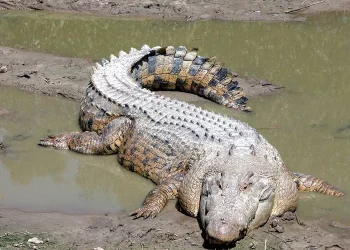Sharks are often depicted as fearsome predators lurking in the depths of the ocean, but amidst the array of formidable species, there exists a diminutive yet captivating creature – the Pygmy Shark (Euprotomicrus bispinatus). Despite its small size, the Pygmy Shark boasts unique characteristics and behaviors that distinguish it as one of the most intriguing inhabitants of the marine world.
Physical Characteristics
Measuring a mere 22 centimeters (8.7 inches) in length on average, the Pygmy Shark is among the smallest known shark species. Its slender body is adorned with a distinctive dark brown to black coloration, while its underside features a pale hue. One of the most striking features of the Pygmy Shark is its large, luminous eyes, which are proportionally larger than those of many other shark species. These eyes, equipped with specialized adaptations for low-light environments, enable the Pygmy Shark to navigate the dimly lit depths of the ocean with remarkable precision.
Distribution and Habitat
The Pygmy Shark inhabits deep-sea environments, where it can be found in oceans around the world. This species is known to occupy depths ranging from 200 meters (656 feet) to over 1,000 meters (3,280 feet), preferring the dark, cold waters of the mesopelagic and bathypelagic zones. Due to its elusive nature and deep-sea habitat, the Pygmy Shark is rarely encountered by humans and remains shrouded in mystery.
Diet and Behavior
As a mesopelagic predator, the Pygmy Shark feeds primarily on small fish, squid, and crustaceans. Despite its diminutive size, this species employs stealth and agility to capture its prey in the darkness of the deep ocean. Utilizing its keen senses and specialized hunting techniques, the Pygmy Shark relies on ambush tactics to secure its meals.
The behavior of the Pygmy Shark is characterized by its solitary nature and nocturnal habits. Under the cover of darkness, these elusive sharks venture out from the depths in search of food, navigating the vast expanse of the ocean with remarkable efficiency. Their ability to thrive in extreme conditions and adapt to the challenges of the deep sea underscores their resilience and evolutionary success.
Conservation Status and Threats
While the Pygmy Shark is not currently assessed by the International Union for Conservation of Nature (IUCN), its deep-sea habitat and elusive nature make it vulnerable to anthropogenic threats such as overfishing, habitat destruction, and climate change. The indiscriminate harvesting of deep-sea fisheries and the impact of bottom trawling pose significant risks to the fragile ecosystems that support the Pygmy Shark and other deep-sea species.
As human activities continue to encroach upon the ocean’s depths, the conservation of deep-sea habitats becomes increasingly imperative. Efforts to establish marine protected areas, regulate fishing practices, and promote sustainable management of deep-sea resources are essential for safeguarding the biodiversity and ecological integrity of these vulnerable ecosystems.
Interesting Facts
Despite its small size, the Pygmy Shark possesses a formidable array of sensory adaptations, including highly developed ampullae of Lorenzini, specialized electroreceptors that detect weak electrical signals emitted by prey.
The Pygmy Shark belongs to the family Dalatiidae, commonly known as kitefin sharks, which includes other small deep-sea species such as the Cookiecutter Shark (Isistius brasiliensis).
Female Pygmy Sharks are believed to exhibit ovoviviparous reproduction, with embryos developing inside eggs within the mother’s body until they hatch and are born as fully formed pups.
Conclusion
In the vast expanse of the ocean, where darkness reigns and mysteries abound, the Pygmy Shark emerges as a remarkable testament to the wonders of marine life. Despite its diminutive stature, this elusive species possesses a unique blend of physical adaptations, behaviors, and ecological significance that captivate the imagination and inspire awe.
As we continue to explore and study the depths of the ocean, it is essential to recognize the importance of protecting and preserving the delicate ecosystems that harbor creatures like the Pygmy Shark. By fostering greater awareness, understanding, and stewardship of our marine environments, we can ensure a brighter future for these fascinating inhabitants of the deep sea.
You Might Be Interested In:



























